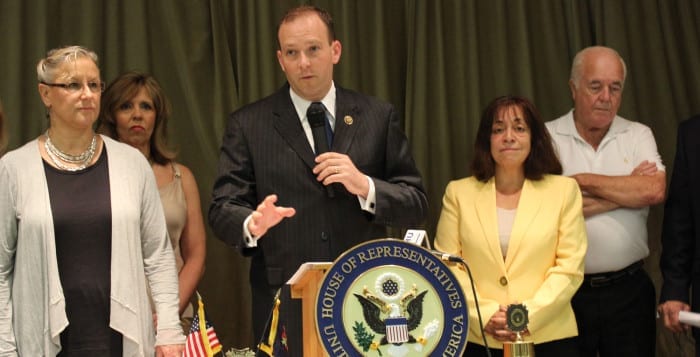The fight against opioid abuse took a step further this week as U.S. Rep. Lee Zeldin (R-Shirley) plugged new legislation. The freshman congressman is a co-sponsor of the Comprehensive Addiction and Recovery Act, which plans to spend $8.3 billion in funding to help combat widespread drug addiction, especially to heroin.
CARA passed through the House of Representatives last week with a bipartisan vote of 407 to 5.
Zeldin, who is a member of the Bipartisan Task Force to Combat the Heroin Epidemic, said he has been a proud supporter of this bill for more than a year now.
“As a co-sponsor of CARA, I have been a vocal supporter of this bill since it was first introduced at the beginning of last year,” he said in a statement. “Over the past year … I have worked closely with our local community, hosting multiple drug task force round tables here on Long Island, to bring together local elected officials, law enforcement, health professionals, community groups, parents, concerned residents and those in recovery, to discuss and develop a more localized solution to address this crisis.”
Zeldin has held heroin events in Smithtown and Brookhaven to meet with community members and keep the discussion open.
The specifics of CARA include $80 million in funding to help prevent and treat addiction on a local level through community-based education, prevention, treatment and recovery programs; $160 million for the expansion of medication-assisted treatment options; and $103 million to establish a community-based competitive grant program to address and treat the problems of heroin and opioid addiction and abuse. Additional funding will also help supply police forces and emergency medical responders with higher quantities of naloxone, known more commonly as Narcan, a medication that is proven to reverse an opioid overdose.
“We must always continue our fight to provide local communities with the resources necessary to help stop and prevent drug abuse through treatment, enforcement and education.”
—Lee Zeldin
Another part of CARA’s funding focuses on pain management and prescription.
According to the bill, the Department of Health and Human Services is required to assemble a Pain Management Best Practices Inter-Agency Task Force, which will review, modify and update the best practices for pain management and prescribing pain medication, and examine and identify the need for, development and availability of medical alternatives to opioids.
The grant aspect of CARA is connected to the Omnibus Crime Control and Safe Streets Act of 1968. CARA is set to amend that bill to authorize the Department of Justice to award grants to state, local and tribal governments to provide opioid abuse services, including enhancing collaboration between criminal justice and substance abuse agencies; developing, implementing and expanding programs to prevent, treat or respond to opioid abuse; training first responders to administer opioid overdose reversal drugs; and investigating unlawful opioid distribution activities.
CARA currently has 44 co-sponsors and is set to go to a vote in the United States Senate.
The North Shore is not immune to the heroin crisis. According to a New York State Opioid Poisoning, Overdose and Prevention Report from 2015, Suffolk County has the highest heroin-related overdose fatalities of any county in New York.
Zeldin said he hopes the Senate will act fast to approve the bill.
“I implore the Senate to act quickly to pass this bill, so that we can start providing the necessary resources to those in need,” he said. “While there is not just one piece of legislation that will solve this crisis, we must always continue our fight to provide our local communities with the resources necessary to help stop and prevent drug abuse through treatment, enforcement and education.”







